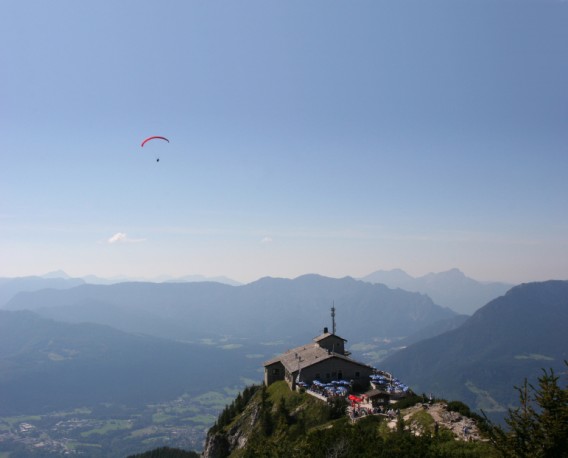
The ‘Eagle’s nest’ – Hitler’s tea-house perched on top of the Kehlstein mountain.
I was recently on a research trip to Germany and took a few hours out to visit the ‘Eagle’s nest’ – the tea house built on the top of the Kehlstein mountain overlooking Berchtesgaden in Southern Bavaria. Hitler loved this area and built his own home – the Berghof – lower down on the slopes of the Obersalzberg.
Martin Bormann, Hitler’s slavish, self-serving secretary, conceived the tea-house as a 50th birthday present for his Boss. And, without question, considerable engineering challenges had to be overcome in its construction. A road had to be cut alongside the steep slopes of the Kehlstein and, just below the tea-house, a tunnel was dug into the mountain and a lift constructed to take guests up the final few metres.
The tea-house was finished, ahead of schedule, in 1938 and then handed over to Hitler on his 50th birthday on 20 April 1939. Bormann often visited his creation atop the Kehlstein – as did Hitler’s girl friend Eva Braun and Joseph Goebbels, the Nazi propaganda minister. But what was a bit of an embarassment for Bormann was that the one person he wanted to impress – Adolf Hitler – didn’t seem to want to use the place at all. In fact, he visited the tea house only about a dozen times and never stayed for long.
The ‘Kehlsteinhaus’, the tea house atop the Kehlstein (or the ‘Eagle’s nest’ as we know it in the English language) is thus a prime example of the difficulty of buying presents for a dictator. What do you give a megalomanic tyrant who already can have pretty much anything he wants?
Bormann’s mistake was in extrapolating out from a few particulars a general view about Hitler’s personality. Yes, Hitler liked the mountains, yes, he liked taking tea, but that didn’t mean he would like a tea-house on top of an Alp.
Hitler’s affection for the Obersalzberg was actually a sign of his deeply provincial and bourgeois taste. Lots of people like walking in the mountains and taking tea – but they don’t want a wacko building like the Kehlsteinhaus which you can only reach by car and lift and makes you feel a bit weird when you are in it.
Then, I got to thinking when I was in the Kehlsteinhaus myself, this place is somehow too conventionally megalomanical for Hitler. He would have seen it as too obvious a statement of power – a bit too ‘Mad King Ludwig’ of Bavaria. And – ultimately – Hitler was much, much stranger and less predictable than that.
 Twitter
Twitter






There is a lot of truth in that. No WW1 no WW2 is correct. The consequences of that so called ‘modern’ war starting in 1914 remain with us to this very day – the loss of the concept of ‘chivalry’ for one thing, and the fact that now civilians are ‘legitimately’ involved to name but two consequences.
There always was something boringly predictable about Hitlers everyday tastes – dumb blondes and cream cakes
I think the way that people around Hitler had this idea that he could be interested in something as normal as a teahouse when he clearly was a thoroughly evil and despicable man. The idea that he is sitting around eating cucumber sandwiches whilst his deputies are organizing the murder of millions of innocent Jews makes me sick.